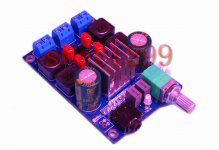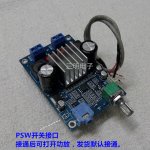Hi all.
Just entering the tpa3116 world, although been planning to do so for some time. Have been getting tips from this thread, so thought I'd say hello.
Received my first pair of "official assembled" YJ blue/black boards from china yesterday, bought them from eBay for £18 the pair. Can't be bad. Proves its always worth making eBay sellers an offer.
Gotta get a new multimeter before making final decisions on mods, then the fun begins.
Just entering the tpa3116 world, although been planning to do so for some time. Have been getting tips from this thread, so thought I'd say hello.
Received my first pair of "official assembled" YJ blue/black boards from china yesterday, bought them from eBay for £18 the pair. Can't be bad. Proves its always worth making eBay sellers an offer.
Gotta get a new multimeter before making final decisions on mods, then the fun begins.
I was checking something in my breeze audio tpa3116 based amp (wlx board), and I found out that the gain resistors values doesnt match any of standard values declared in the datasheet. The values are 47K and 100K, according to the datasheet for 32db the values should be 39K and 100K, wich are the values shown in the silkscreen of the board.
What gain would give this values!?...something around 34db?.
The gain is not set by the exact value of the resistors. The resistors form a voltage divider which the chips ADC reads on startup. The range of values set one of the fixed gains which I think goes 20dB 26dB 32dB 36dB I may be missing one but the gain is not continuously variable.
edit: And order the snubber parts I suggested in the Wiener thread when you make your Mouser order - 2 of each:
B32529C105J EPCOS / TDK | Mouser
ROX3SJ8R2 TE Connectivity / Neohm | Mouser
I searched the wiener thread and didn't find your suggestion. Can you point me there? I might pick up a meanwell to compare against some other supplies.
BK
Just realized I meant 'zobel', not snubber. Recommendation is based on the speaker parameters. A common recommendation is:I searched the wiener thread and didn't find your suggestion. Can you point me there? I might pick up a meanwell to compare against some other supplies.
BK
Rz = 1.2 * Re
Cz = Le/Rz^2.
I use an Octave program that calculates the compensated speaker impedances and plots impedance/frequency response vs frequency, I start with the above formula for starting values and tweak until I get something that looks nice and flat and uses common R/C values. See this post:
http://www.diyaudio.com/forums/clas...alculation-tpa3116-8-filters.html#post4247123
I received YJ audiobah clone boards yesterday. I'm planning to use them as pbtl. I have Lambda jws100-24 smps. Is it possible to power up both boards with this? JWS100-24 is specced as 4.5A max current. Is it sufficient for this task?
An externally hosted image should be here but it was not working when we last tested it.
As i have damaged two of my YJ blue boards I want to replace them maybe with some better ones.
This one can be an option?
TPA3116D2 power amplifier board trolley Vehicle Electronics 50W amplifier board with a boost ACC controltrxtqrprkij from English Agent:BuyChina.com
Thank you!
This one can be an option?
TPA3116D2 power amplifier board trolley Vehicle Electronics 50W amplifier board with a boost ACC controltrxtqrprkij from English Agent:BuyChina.com
Thank you!
I had a chance to play with 2 of my 3 boards so far.
First, the TPA3116D2 50W+50W.
Sounds great as is. No problem running it with my TABAQs.
Then, the TPA3116 100W sub amp.
Not great. Someone mentioned it sound muddy.... it does. Also, there is a lag of about 1/3 second between the mains (powered by the first board) and the sub, powered by this one.
Since both amps are fed from the same signal (and I had that sub with a plate amp before that sounded ok), I guess I can put the blame on the filter used as a lowpass on this board. It is muddying and delaying the sound.
Perhaps if I were to disable the filter and run the crossover from my computer instead, but I had no time to look it up and try.
First, the TPA3116D2 50W+50W.
Sounds great as is. No problem running it with my TABAQs.
Then, the TPA3116 100W sub amp.
Not great. Someone mentioned it sound muddy.... it does. Also, there is a lag of about 1/3 second between the mains (powered by the first board) and the sub, powered by this one.
Since both amps are fed from the same signal (and I had that sub with a plate amp before that sounded ok), I guess I can put the blame on the filter used as a lowpass on this board. It is muddying and delaying the sound.
Perhaps if I were to disable the filter and run the crossover from my computer instead, but I had no time to look it up and try.
Attachments
Can you get the filters schematic? 300ms is a lot, I wouldn't know how to achieve this with just 1-2 opamps.
What happened?
After checking all the parts I think the TPA chip is damaged.
Could it also be that the subwoofer output is only a 1st order slope? I have yet to find out any information on what slope the Breeze 2.1 unit uses but it does seem to let some upper frequencies bleed into the subwoofer. This for me makes it unusable and i just use the main outputs. Is there anyway around that? Could be really nice if any of the 2.1 units used a 4th order crossover on the sub output.
4th is also 24dB versus 6dB for a 1st order which would mean a steeper roll off for 4th order
I made myself some small 200Hz active x-overs:
Active 2.1 crossover/crossover with MAX4478 - #360customs
Active 2.1 crossover/crossover with MAX4478 - #360customs
Last edited:
That's a 10800 degree phase shift at 100Hz, which in theory requires a 240th order filter. Yeah.Can you get the filters schematic? 300ms is a lot, I wouldn't know how to achieve this with just 1-2 opamps.
I just got a YJ blue/black TPA3116 board - hooked it up (stock) to a Raspberry Pi 2 with a HiFiBerry DAC+ and powered it with a laptop brick (24V). It's being used to power some in-ceiling speakers in my kitchen. P
Problem is, I'm getting a pop/click between each track - this is not something that I experience when the Raspberry Pi/dac combo is connected to a different amplifier. Has anyone else had this issue? And more importantly, has anyone solved it?
Problem is, I'm getting a pop/click between each track - this is not something that I experience when the Raspberry Pi/dac combo is connected to a different amplifier. Has anyone else had this issue? And more importantly, has anyone solved it?
a dumb question around the boards. What is the role of the inductors on the board. I have seen most of the boards have one or multiple inductors. Are the ones that have it better than the ones that dont?
the second question is around the snubber mod. How do you know if the pcb has one or is it safe to assume that none of the boards have it.
the second question is around the snubber mod. How do you know if the pcb has one or is it safe to assume that none of the boards have it.
a dumb question around the boards. What is the role of the inductors on the board. I have seen most of the boards have one or multiple inductors. Are the ones that have it better than the ones that dont?
the second question is around the snubber mod. How do you know if the pcb has one or is it safe to assume that none of the boards have it.
the second question is around the snubber mod. How do you know if the pcb has one or is it safe to assume that none of the boards have it.
The inductors are part of the output filter that removes/dampens the output switching frequency--> 400kHz which makes a lot of electromagnetic noise which is illegal to send out into the air. Affects radios and such.. Simply put, bigger shielded inductors are better and more costly. They can handle more current without rising resistance, and saturation is less of a problem. The shielding makes for less interference into surrounding components and wires.
Its pretty safe to assume that none of the boards have snubbers. Snubbers are often visible on detailed pictures of the area between the bootstrap capacitor and the inductor. (a small resistor and capacitor in series leading from each speaker wire to ground(4 snubbers for 4 output wires😉 ). The components after the inductor is always part of the output filter that it should have. If you keep speaker wires extremely short the 400kHz frequency won't radiate as much (less antenna effect). Most people use the bulletproof legal filter version^^. I hope this cleared up your questions without being to technical🙂
Its pretty safe to assume that none of the boards have snubbers. Snubbers are often visible on detailed pictures of the area between the bootstrap capacitor and the inductor. (a small resistor and capacitor in series leading from each speaker wire to ground(4 snubbers for 4 output wires😉 ). The components after the inductor is always part of the output filter that it should have. If you keep speaker wires extremely short the 400kHz frequency won't radiate as much (less antenna effect). Most people use the bulletproof legal filter version^^. I hope this cleared up your questions without being to technical🙂
Last edited:
Hi
I had a strange experience with two of my TPA3116 boards this evening. I tried one board with a 3 tube pre that I use to listen last year just to compare the sound with another one. As soon as i power on the amplifier it start with a strong an repetitive pop in right speaker only. I immediately disconnected the pre an power on the amplifier again. Unfortunately it continue with this behavior only. Doing once again with a new board (curiosity killed the cat 🙂 ) and I received the same result. The pre use to be in a good condition until now but now obviously is not working and killed my boards.
Any idea how to fix first the boards and then the pre?
Thank you!
Solved.
I realized that after trying to improve the pre-amplifier with a new ALPS pot something was done unclean with the wiring and I think that was the reason for the preamp to start oscillate and damaged the amplifier module.
After re-work all the wiring and measure everything now it works perfect. The TPA3116 modules are still damaged... 🙁
Thank you!
- Home
- Amplifiers
- Class D
- TPA3116D2 Amp

